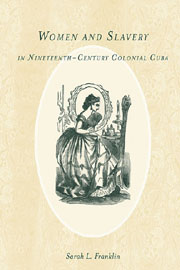Book contents
- Frontmatter
- Contents
- List of Illustrations
- Acknowledgments
- Introduction: Patriarchy, Paternalism, and the Development of the Slave Society
- 1 Virgins and Mothers
- 2 Wives
- 3 Pupils
- 4 The Needy
- 5 Wet Nurses
- Conclusion: A Shifting Landscape
- Abbreviations
- Notes
- Bibliography
- Index
- Rochester Studies in African History and the Diaspora
2 - Wives
Published online by Cambridge University Press: 05 February 2013
- Frontmatter
- Contents
- List of Illustrations
- Acknowledgments
- Introduction: Patriarchy, Paternalism, and the Development of the Slave Society
- 1 Virgins and Mothers
- 2 Wives
- 3 Pupils
- 4 The Needy
- 5 Wet Nurses
- Conclusion: A Shifting Landscape
- Abbreviations
- Notes
- Bibliography
- Index
- Rochester Studies in African History and the Diaspora
Summary
I am an unhappy woman in a most deplorable time without hope of human help in this country, now resorting to your benevolent justice, trusting you will not say no to my request.
—Rufina Betancourt to the captain general, 1802Marriage figures prominently in any discussion of women. A matter of great significance, marriage required the oversight of the state. The emergence of the family as the locus of state authority and the societal emphasis on motherhood ensured that not only would the state advocate marriage but also it would buttress the institution against any perceived offenses. If marriage were a way to order society, then adultery and divorce represented tremendous forces for disorder. Women could not be allowed to undermine hierarchy, and elites responded swiftly and directly to perceived affronts, further testifying to the significance of the institution of marriage. Patriarchal authority in Cuba worked in some cases to circumscribe the privileges of women. Like slaves, however, women had minds of their own that did not always agree with those of their “masters”; they could and did work to advance their own agendas in the face of societal constraints. In this chapter I will investigate the institution of marriage to focus on women's experiences in nineteenth-century Cuba and to reveal the role marriage played in the formation and conservation of the Cuban slave society.
- Type
- Chapter
- Information
- Women and Slavery in Nineteenth-Century Colonial Cuba , pp. 38 - 70Publisher: Boydell & BrewerPrint publication year: 2012



